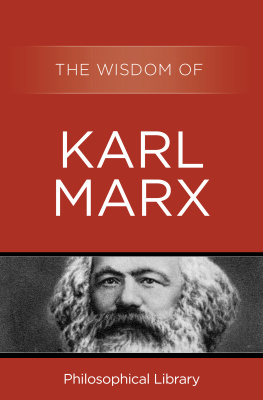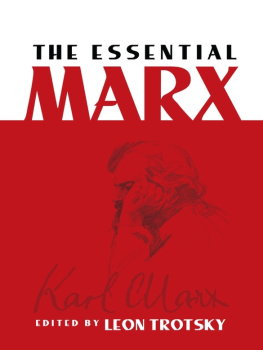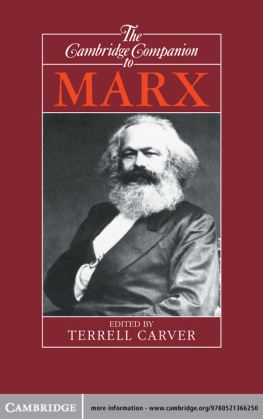First published in 1920
by George Allen & Unwin Ltd
This edition first published in 2016 by Routledge
2 Park Square, Milton Park, Abingdon, Oxon, OX14 4RN
and by Routledge
711 Third Avenue, New York, NY 10017
Routledge is an imprint of the Taylor & Francis Group, an informa business
1920 Eden & Cedar Paul
All rights reserved. No part of this book may be reprinted or reproduced or utilised in any form or by any electronic, mechanical, or other means, now known or hereafter invented, including photocopying and recording, or in any information storage or retrieval system, without permission in writing from the publishers.
Publishers Note
The publisher has gone to great lengths to ensure the quality of this reprint but points out that some imperfections in the original copies may be apparent.
Disclaimer
The publisher has made every effort to trace copyright holders and welcomes correspondence from those they have been unable to contact.
A Library of Congress record exists under LC control number: 20014209
ISBN 13: 978-1-138-64046-7 (hbk)
ISBN 13: 978-1-315-63656-6 (ebk).
Foreword
BY
EDEN AND CEDAR PAUL
FOREWORD
I T has been said that the professional and professorial exponents of economic science confine themselves to variants of a single theme. Usually belonging to the master class by birth and education, and at any rate attached to that class by the ties of economic interest, they are ever guided by the conscious or subconscious aim of providing a theoretical justification for the capitalist system, and their lives are devoted to inculcating the art of extracting honey from the hive without alarming the bees. Achille Loria is an exception to this generalisation. Professor of political economy at Turin, and one of the most learned economists of the day, he is anything but an apologist for the bourgeois economy. With the exception of the first volume of Marx's Capital, no more telling indictment of capitalism has ever been penned than Loria's Analysis of Capitalist Property (1889). This gigantic work has not been translated, but a number of Loria's books are available to English readers: The Economic Foundations of Society, 1902; Contemporary Social Problems, 1911; The Economic Synthesis, 1914. A biographical and critical study of Malthus, in the Italian an early volume of the series of booklets of which the present essay on Marx forms one of the latest issues, was rendered into English in 1917 and published in the United States as the opening chapter of a symposium on Population and Birth Control edited by the writers of this foreword. The Economic Foundations of Society has run through five editions in Swan Sonnenschein's (now Allen & Unwin's) "Social Science Series." But on the whole Loria's works are less widely known in England than on the continent, far less widely known than they deserve to be. An exposition of his outlook and a study of his relationship to Marx will not only be of interest in themselves, but will help readers to surmount certain terminological difficulties in the Karl Marx. All original thinkers write perforce in a language of their own minting. Those of us to whom "surplus value," the "class struggle," the " materialist conception," " economic determinism, have been familiar concepts from childhood upwards, are apt to forget that Marx's contemporaries were repelled by what they regarded as superfluous jargon. The first students of Kant, the first students of Darwin, the first students of all great innovators in philosophy, science, and the arts, have had to master a new vocabulary before they could understand what these writers were driving at; for new ideas must be conveyed in a new speech or by the use of old words refashioned. We cannot understand Loria, we cannot appreciate Loria's criticism of Marx, we cannot grasp the nature of Loria's own affiliation to Marx, unless we realise precisely what the Italian economist means by the speciously familiar terms "income," "subsistence," "unproductive labourers," "recipients of income," and the like. The familiarity of the words makes them all the more misleading to those who do not hold the Lorian clue to guide them through the economic labyrinth. Does this sound alarming? Yet Loria's doctrines, like those of Marx, like those of Darwin, like those of but we must not say "like those of Kant "are simplicity itself to anyone who is able to survive the first shock of the encounter, to surmount the first agony of a new idea.
In our own view the difficulty of economics in large part depends upon the fact that it is either a system of apologetics or else a system of attack. There are, in fact, two conflicting sciences; the economic science of the master class, and the economic science of the proletariat. Both are necessarily tendentious, and the conflicting tendencies will remain irreconcilable as long as the class struggle continues. Not until that struggle has been fought to a successful issue, not until the co-operative commonwealth has come into existence, can there be a comparatively dispassionate political economy. As dispassionate as conic sections it can never be, for it is biological, sociological, is by its very nature tinged with human interest, and can therefore never be wholly impartial. But many of the contradictions and perplexities of economics are by no means inherent; they are, we contend, no more than confusing reflexes of the class struggle. Loria seems to hold a somewhat similar opinion. In Contemporary Social Problems (pp. 99, 100) he writes: "I am inclined to consider political economy and socialism as two intellectual weapons which, for a long time separate and mutually antagonistic owing to the apologetic theories of the one and the subversive utopianism of the other, are drawing closer and closer together as they become more human and the old animosities disappear. Perhaps the day is not far distant when the two forces will unite under one standard." To a casual reader this might suggest that Loria thinks that the class struggle, that the conflict between orthodox economics and socialism, can be overcome within the framework of the bourgeois economy that the capitalist Old-Man-of-the-Sea can at one and the same time remain seated upon the back of the proletarian Sindbad the Sailor, and walk beside him amicably arm in arm as the two climb the mount of human endeavour. But an attentive student of Loria's Karl Marx will realise that when the Italian speaks of "a day not far distant," he means the morrow of the social revolution, when Marx's promethean work shall have been completed, and when, led by Marx "the emperor in the realm of mind," the human race shall have reached "the brilliant goal which awaits it in a future not perhaps immeasurably remote" (infra p. 91).















